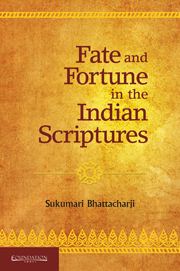Book contents
- Frontmatter
- Contents
- Preface
- Introduction
- Chapter 1 Inception
- Chapter 2 Rebirth and Transmigration
- Chapter 3 Karman and its Consequences
- Chapter 4 Karman, Fate and Free Will
- Chapter 5 Fate, Eschatology and Liberation
- Chapter 6 Premonitions and Presages
- Chapter 7 Deflection: Remedial Measures
- Chapter 8 Vicarious Deflection
- Chapter 9 Fate and Human Endeavour
- Bibliography
- Index
Chapter 5 - Fate, Eschatology and Liberation
Published online by Cambridge University Press: 05 October 2014
- Frontmatter
- Contents
- Preface
- Introduction
- Chapter 1 Inception
- Chapter 2 Rebirth and Transmigration
- Chapter 3 Karman and its Consequences
- Chapter 4 Karman, Fate and Free Will
- Chapter 5 Fate, Eschatology and Liberation
- Chapter 6 Premonitions and Presages
- Chapter 7 Deflection: Remedial Measures
- Chapter 8 Vicarious Deflection
- Chapter 9 Fate and Human Endeavour
- Bibliography
- Index
Summary
WHAT happens to the man who dies? Christian theology as expressed in the lexicon says that eschatology means the four last things: death, judgment, heaven and hell. Of these, Brahmanism does not have a judgment per se. In this chapter we shall look at the fate of the dead man which in brahmanical terms has many more alternatives than the lexical meaning of eschatology in English. A man may go to heaven or hell temporarily and then shift to the other place according to the length of time he has earned himself in either place through his karman on earth. He can attain liberation: mokssa or nirvāṇa; he can be reborn in a human, subhuman or inanimate state. He can become a disembodied spirit—good or bad and hover in the upper or lower regions doing good or harm to men according to the nature of the spirit. He can also hover in an astral body. It is clear that these post-mortal fates are mutually exclusive but can be experienced successively or in different births.
The most usual and frequent fate of the dead soul is rebirth. But man's first inkling of the ancient man's belief regarding post-mortal existence is born out of excavations. The gravegoods, especially for the affluent—servants, wives, necessary and luxury items, coaches or chariots and draft animals— prove beyond doubt that man then believed in (1) the existence of the departed soul in some form after death, (2) its capacity to enjoy the good things of life and, conversely, to suffer from lack of these items, (3) some fear or obligation felt by the survivors to serve the departed kinsman which prompted the provisions. Clearly the soul’s departure to heaven or hell or liberation or movement in an astral form was not visualized as a long-term possibility—hence the gravegoods.
- Type
- Chapter
- Information
- Fate and Fortune in the Indian Scriptures , pp. 114 - 151Publisher: Foundation BooksPrint publication year: 2014

